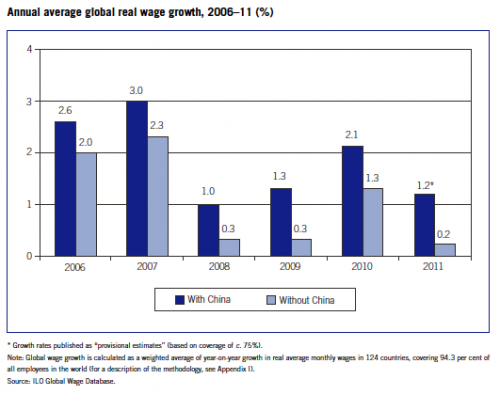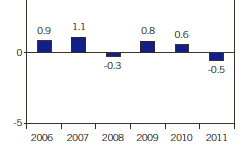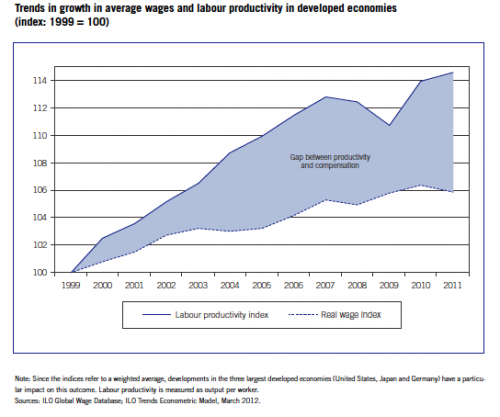The ILO recently produced their growth and wages report for 2012/13. This suggested that across the developing world, labour markets are being characterised by falling real wages and a decline in labour’s share of national income. In particular:
- Real wage growth has been flat – even negative in the past few years.
- There is an increasing gap between productivity growth and wage growth. Wages are not rising along with productivity.
- Wages are becoming a smaller share of national income.
- In 16 developed economies, labour took a 75% share of national income in the mid-1970s, but this has dropped to 65% in 2007. It rose in 2008 and 2009 – but only because national income itself shrank in those years – before resuming its downward course. (Wages in developed world shrink at Guardian)
Real Wage Growth

It is common to refer to the low wages of China, but wages in China have roughly tripled in the past decade – meaning China has one of best wage growth rates in the world.
However, if we look at just developed economies, we see even lower wage growth.
Real Wage Growth – developed economies

The global credit crisis has also resulted in increased inequality. Wage income is declining as a share of overall national output. Improvements in labour productivity are not being matched by real wage growth. This graph below shows the increased divergence between wage growth and productivity.

What Causes the decline in wages as a share of National Income?
- Technological progress. Improved technology enables, higher labour productivity and encourages a more capital intensive production process. With greater capital intensity, labour makes up a smaller share of national income. However, in the past, productivity growth has often been matched by rising real wages. Technological change doesn’t totally explain why rising productivity is now failing to be matched by rising wages.
- Globalisation. The increased global nature of product markets has increased the competitive pressure on firms to cut costs. European countries with rising unit labour costs have been left uncompetitive and declining demand. There has been increased pressure to cut labour costs because of the Euro crisis.
- Decreasing union density. Across the developed world, trade unions are in decline. In the UK, we have seen a rapid fall in union density due to industrial decline, changes in attitudes to unions and firms trying to avoid union bargaining power. The experience of the UK has been matched in other countries, such as the US. The consequence is that labour markets are increasingly flexible and it’s harder for workers to bargain for higher wages.
- Increased Monopoly / Monopsony Power. One explanation for the declining share of national income experienced by workers is increased monopoly power. (see: Who broke America’s job machine?) If there is increased market concentration, firms can make a higher profit margin, which is distributed to shareholders rather than workers. Even the debate about multinationals avoiding paying corporation tax is relevant. If firms avoid paying corporation tax, it increased the inequality of income and wealth by enabling owners of large companies to keep more retained profit rather than pay to government who may have to increase income taxes on labour.
- Low real interest rates. Another possible explanation is that since 2007, real interest rates have been low. This increases the attractiveness of investing in capital. With increased capital intensity, it is not surprising if labour’s share of income falls.
Implications of falling labour share of income
- Increased inequality within society. The decline in labour’s share of income is also occurring alongside increased wage inequality.
- Falling real wages are a significant negative impact consumption and aggregate demand. – Important during economic downturn.
- The pursuit of internal devaluation (restoring competitiveness through lower wages) risks prolonged recession that we are seeing in southern Europe.
External Links
- Summary of the Global wages report at the ILO
- Technology or monopoly power? at NY Times
Related

VERY HELP FULL